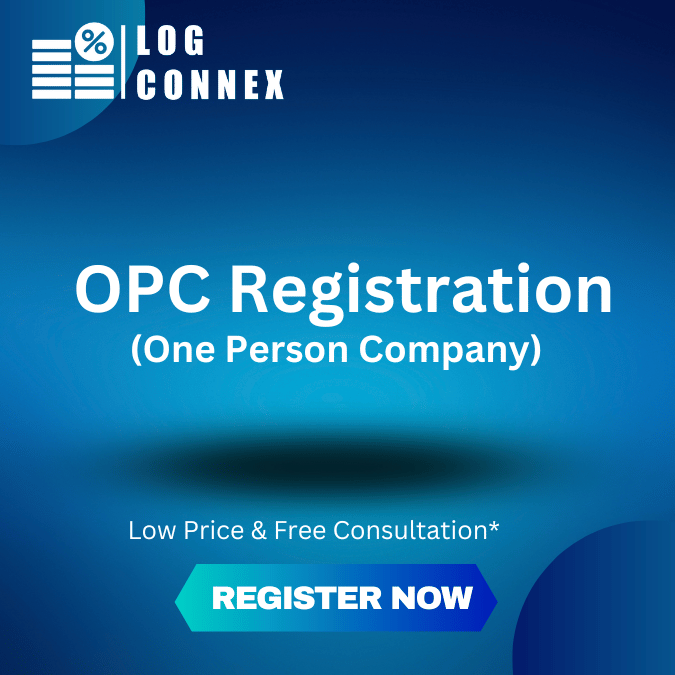One Person Company (OPC)
₹15,999.00 Original price was: ₹15,999.00.₹11,999.00Current price is: ₹11,999.00. (incl. of taxes)
Summary
-
Price may Increase on basis of authorized capital, govt. Fees
For Company Incorporation
List of Documents :
Pan card
Aadhar card
Voter card or Driving License or Passport
Bank Statement or Passport
Phone no
Mail id
PhotoFor Company address proof
Electricity bill where address is mentionedPackage Includes:
✅ Digital Signature
✅ DIN Of Director
✅ Filing of Spice form
✅ Issue of Incorporation Certificate along with PAN and TAN
✅ Memorandum of Association
✅ Articles of Association
✅ Provisional PF ESI Registration
✅ Government fees included
✅ MSME Registration of your company
✅ Business Commencement Certificate (If within 180 Days) INCLUDED
✅ Bank Account Opening Documents INCLUDED
A one-person company (OPC) is a type of private limited company in India that is owned and managed by a single person. It was introduced in the Companies Act, 2013, and is a hybrid of a sole proprietorship and a private limited company.
OPCs have the following benefits:
- Limited liability: The liability of the member of an OPC is limited to the amount of capital that they have contributed to the company.
- Separate legal entity: An OPC is a separate legal entity from its member, which means that the member’s personal assets are protected from the liabilities of the company.
- Perpetual succession: An OPC can continue to exist even after the death of its member, as long as there is a nominee appointed to take over the membership.
- Ease of formation and management: OPCs are relatively easy to form and manage, as they do not require a board of directors or a separate auditor.
However, there are also some restrictions on OPCs, such as:
- The paid-up share capital of an OPC cannot exceed ₹50 lakh.
- The average annual turnover of an OPC cannot exceed ₹2 crore.
- An OPC cannot issue more than one class of shares.
Overall, OPCs can be a good option for small businesses that want the benefits of limited liability and a separate legal entity, but do not want the complexity of a traditional private limited company.
Here are some of the key features of an OPC:
- Only one member: An OPC can have only one member, who is also the director of the company.
- Separate legal entity: An OPC is a separate legal entity from its member, which means that the member’s personal assets are protected from the liabilities of the company.
- Limited liability: The liability of the member of an OPC is limited to the amount of capital that they have contributed to the company.
- Perpetual succession: An OPC can continue to exist even after the death of its member, as long as there is a nominee appointed to take over the membership.
- Ease of formation and management: OPCs are relatively easy to form and manage, as they do not require a board of directors or a separate auditor.
RELATED PRODUCTS
Limited Liability Partnership (LLP)
Nidhi Company
Nidhi Company is an NBFC (Non-Banking Financial Company) which is formed with the object of cultivating the habit of thrift and savings amongst the members and receiving deposits from and lending to the members for their mutual benefits. It doesn't require to take a license from the RBI. Instead, it is registered as a Public Company and should use “Nidhi Limited” as the last words in its name.
Producer Company
- Photograph Latest Passport size photograph of Shareholders and Directors
- PAN Card PAN Card of shareholders and Directors.
- Identity Proof Voter ID/ Passport/ Driving License of Shareholders and Directors
- Rent Agreement Rent Agreement of the registered office should be provided, if any
- Business Address Proof Electricity Bill/ Telephone Bill of the registered office address in India
- NOC from owner No Objection Certificate to be obtained from the owner(s) of registered office
- Address Proof Telephone Bill /Electricity Bill/ Latest Bank Account Statement of Shareholders and Directors
Proprietorship
Public Limited Company
Our Public Limited Company Registration package includes:
-
DIN 3 Directors
-
DSC for 7 directors and shareholders
-
Drafting of MoA & AoA
-
Registration fees and stamp duty
-
Company Incorporation Certificate
-
Company PAN and TAN
-
Company PF and ESIC Registration
-
Business Commencement certificate of the company
- Gst Registration Certificate






